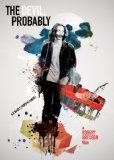| Reviews & Columns |
|
Reviews DVD TV on DVD Blu-ray 4K UHD International DVDs In Theaters Reviews by Studio Video Games Features Collector Series DVDs Easter Egg Database Interviews DVD Talk Radio Feature Articles Columns Anime Talk DVD Savant Horror DVDs The M.O.D. Squad Art House HD Talk Silent DVD
|
DVD Talk Forum |
|
|
| Resources |
|
DVD Price Search Customer Service #'s RCE Info Links |
|
Columns
|
|
|
Devil, Probably (Le Diable, probablement), The
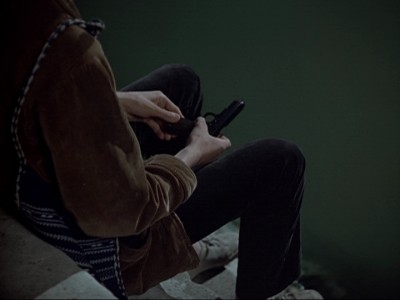
"I ask for nothing, I lay claim to nothing."
"No, you want to be an exceptional guy in an exceptional world."
Robert Bresson, the great French director who gave us Pickpocket (1959), A Man Escaped (1956), and Au Hasard Balthazar (1966, and in this reviewer's running for best film ever made), only made 13 features in a career that spanned five decades, but that only represents one of the most splendid cases ever of quality over quantity: Practically every one is a masterpiece, and 1977's The Devil, Probably (Le Diable, probablement), his next-to-last film before his death in 1999, is no exception. Like many of Bresson's other films, The Devil, Probably recounts the journey of a particularly, exquisitely sensitive soul, one that longs for purity and is excruciated by seeing, feeling, and experiencing everything in the deepest possible way, enduring it all with a forebearing patience that should never be mistaken for acceptance: The condemned man in A Man Escaped, the priest in Diary of a Country Priest (1951), the desperate young girl in Mouchette, the donkey protagonist of Balthazar -- all of them are beautiful souls trapped in an ugly world and plotting, seeking, or awaiting some escape, some salvation. That that escape into their rightful freedom and state of grace comes, in three of the five aforementioned films as well as in The Devil, Probably, in the form of death sounds much bleaker than Bresson's pictures ever are; they're piercingly serious, each of their painstaking frames replete with well-earned gravity, but that makes for a contemplative, sobering but refreshing, cleansing experience, never dreary bleakness. In each film and over the course of his filmography, Bresson is undertaking, on artistic terms, the same journey as most of his principal characters, a tense, fraught, and anguished search for what's true and necessary, and only what's true and necessary, in each shot, cut, sound, and performance, the rigorous distancing and removal of anything superfluous, extraneous, or distracting from the essential, and The Devil Probably marks yet another significant milestone on that tremendous odyssey.
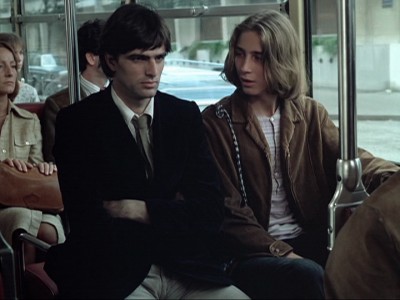
The pure, Bressonian soul in this film is an idealistic, utterly disenchanted and disaffected young Parisian called Charles (Antoine Monnier) -- one of what appears, from the film's tightly controlled mise-en-scène, to be a generation of sad, disappointed, seemingly lazy but actually paralyzed generation of youth. Immersive, reassuring religious belief has been untenable since long before these kids were even born, and the May 1968 almost-Revolution of the generation immediately preceding them lingers on as a disillusioning failure. Charles and his friends -- Edwige (Laetitia Carcano) and Alberte (Tina Irissari), who both love Charles, who can't tell who or what is worth loving and passively, indifferently alternates between coolness and tenderness toward them; Michel (Henri de Maublanc), a sweet, sincere rich-kid environmental activist; and Valentin (Nicolas Deguy), a shoplifting heroin addict -- loaf, roam, agonize over love indulged and unrequited, sit in on pointless debates between a tiny group of parishioners and a defensive priest in a mostly-empty church, and watch film footage of ghastly, grotesque environmental destruction. They also drop in on lectures by a sinisterly charismatic bookstore owner/nihilistic intellectual who facilely urges the rapid completion of the self-destruction of humankind from which it's already much too late to turn back. This glib, handsome ringleader has bands of these let-down young adults slipping pornographic photos into the theological tomes at the church bookshop and apparently feeling like they're actually changing the world in the process; when Edwige is lured away from Charles by this pleasing fraud and follows him, against her better judgment, for a hotel-room tryst, it's as if she's slept with the devil himself.
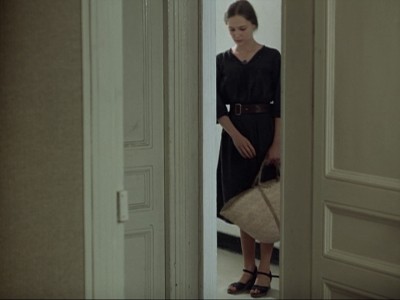
Charles, who resists all such grandstanding and any ideology in favor of, when he can, selflessly, modestly performs acts of actual care like showing some fellow loiterers how they can tell whether or not their gait is physiologically balanced by noting the wear on their soles for symmetry; helping struggling math students by sharing his nonchalant genius for the subject (Charles is a dropout, yes, but with a gifted mind so sharp it's a blessing and a curse); or trying to help the parasitic, amoral, completely lost Valentin through the pains of his addiction. Michel loves Alberte, who loves Charles, who is as wary of becoming embroiled in these emotional bonds/chains/inconsequential vicissitudes as he is of the other solutions to his weary soul-sickness that present themselves: The nihilistic bookstore proprietor is easy for the wise Charles to disdainfully dismiss, the petty spats of religionists not much less so, and even the more noble (if doomed to inefficacity) credos and advice of Michel and his environmental crusade or a very qualified and sophisticated psychoanalyst (Régis Hanrion) reveal themselves to be compromised, useless in Charles's impossible, admirable quest for something entirely untainted. What taints everything in Bresson's world here is a poison underlined in the very title of his next, final film, 1983's L'Argent: money, whether via the profit-interest that will keep nuclear danger/deformation and environmental degradation thriving and indefatigable to the bitter end, the 200 francs an hour the kind psychoanalyst charges for his help, or the abysmal, inescapable complicity between the Church and filthy lucre (highlighted in a gorgeous an impeccable sequence wherein Valentin breaks open the church poorboxes in an orgy of avarice and withdrawal-induced thievery; even money meant for good can only do harm in the end). The Devil, Probably was made well into the period when the always markedly Catholic Bresson described himself as a "Christian atheist," but that older-and-wiser Catholic ethic is still there in his bitter, unmistakable and unqualified horror of money in a way that marks him off as Catholic in a way that's pure (there's that word again), distinct from both the "official," grossly hypocritical Church and wide-eyed, optimistic, self-serving Protestant equivocations on the matter.
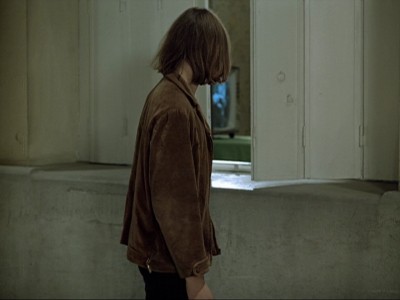
Slowly but surely, then, all the boxes for potential salvation are checked off as invalid by Charles, save for exempting himself from this unbearably compromised, doomed world through suicide, which is an option he is contemplating, weighing, and tacitly preparing himself for -- very seriously and with no adolescent triviality (Albert Camus himself would have been proud) -- throughout the film. In a peculiarly Bressonian touch -- which is what makes this divulgence no spoiler -- Charles's ultimate suicide (for which he recruits the aid of Valentin, his own personal Judas, in exchange for, you guessed it, a fistful of cash) is known to us from the film's very first frames, which flash newspapers with headlines announcing the case of the young man who killed himself/had himself "murdered" before taking us back six months to the "beginning" of Charles's story. Bresson is always about inevitability, never "suspense" in any way movies usually understand it; what happens at any given moment thus becomes much less important, infinitely less revealing than how it happens, the conreteness lent by the unblinking camera eye and the attainment of exactly the right framing, duration, movement (if any), editing, and sound that will make for the most powerful, indelible impact. How do we know that Charles's soul is a genuinely sensitive, anguished, pure one? Not because of anything he says, certainly (Monnier, like virtually all Bresson "models" -- he refused the term "actor" -- is a nonprofessional, directed into neutral, impassive line readings, cast for the convincingness of his physical presence, not for performative skill that would be of no use for Bresson) but because of the way Bresson captures him as he sits in Michel's car when they stop at a site where trees are being felled. More than any of the archival footage of environmental atrocity interpolated into the film as viewed by Michel et al., Bresson's meticulous, marvelous creation of this scene -- his specacular use of sound as the trees crack, break, and crash, amputated from their roots and from life, to the ground, all punctuated with cut-ins of Charles cringing, hands on his ears, in the car -- makes us feel what Charles feels, justifying and allowing us to thoroughly understand him and his angst. Those trees are being butchered, and the too-precise, too-clear sounds of their death resembles nothing so much as the similarly ultra-accurately recorded sounds of the blows delivered to the innocent animal in Au Hasard Balthazar...which is exactly how Charles, and we, take them.
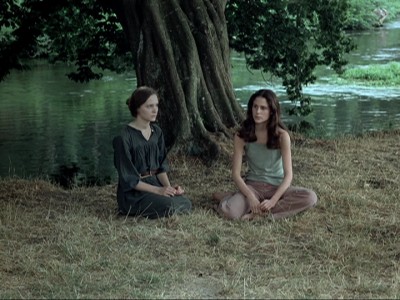
The stunning accomplishment, invention, and physical effect of that scene is central, but it's only one instance of the most acute cinematic perfection in a film where that perfection never relents and only continues to build upon itself, to accumulate yet more gravity and transfixing power, scene after scene. There's also the sequence depicting an impromptu philosophical dialogue/argument among passengers on a city bus that's punctuated with isolated close-ups the mechanics of said passengerdom -- doors opening/closing, entrances and exits, tickets being punched stops being called -- that defamiliarize in an awesomely radical way, lending the bus and its inhabitants an aura of microcosm standing in for the entire earth and a human race that quibbles among itself even as their vehicle hurtles through random cosmic "traffic" toward who knows what end or catastrophic crash. (It's a bravura passage that rivals, then surpasses, the classic, similarly constructed and paced "procedural" shots of pickpockets at their trade in Pickpocket). Or the scene in which a group of intrepid young people insist on enjoying a grassy lakeshore despite the water being polluted and human presence forbidden, with an interruption by the police and their attempt, wondrously composed and edited, to hide from their persecutors in the long grass -- to blend back into and shelter themselves in a cut-off and despoiled nature. Then there is always, always the strange, inimitable significance of objects, movements, gestures -- always more significant, more carefully and minutely and thoughtfully conceived and executed in Bresson's pictures than in anyone else's -- with Bresson and cinematographer Pasqualino De Santis (a frequent Visconti collaborator who also shot L'Argent and Bresson's Lancelot du Lac) framing, composing, editing, and mixing in such a way to give every element of each and every moment its proper, solid weight and presence.
The cumulative effect of this immensity of care and conscientiousness at every single level and at every single moment, here as in most of Bresson's work (and The Devil, Probably demonstrates once more that "great Bresson film" is usually a redundancy) is our immediate, moment-by-moment physical involvement, in thrall to the astonishingly well-honed, absolutely essential quality of every image, movement, and sound, through which a slowly building, purposely delayed but finally exalted, transcendent emotional response occurs, to the point that you may need to shut your eyes after it's all over just to breathe and mull the inexorable impact of what you've just seen. Bresson was nothing short of a maker of cinematic miracles, and this film is just as miraculous, if not more so, than any of his other masterworks, another perfect mystery for the church of cinema's true believers to repeatedly, reverently, ecstatically ponder.
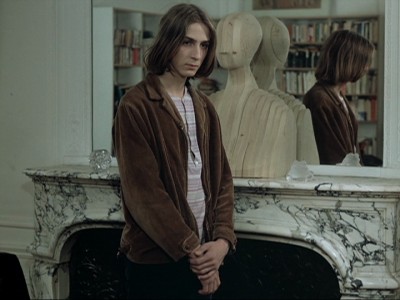
THE DVD:
A reviewer more qualified than I claims (and offers evidence of) interlacing on this Region 1 DVD transfer, which presents the film at its original aspect ratio of 1.37:1. However, perhaps owing to my using a non-television-based setup (an Epson 8350 projector), that particular issue wasn't apparent to my eye at any point. What I did notice, comparing my copy of the UK/Region 2 Artificial Eye release to this DVD, was a not terribly significant difference in picture quality: probably a bit too much DNR has been used in either case, there is intermittent edge enhancement visible on both editions, but, although the Artificial Eye edition seems to have a slight edge, either version is a few cuts above just passable, with generally a sharp, clear image, solid blacks, and what appears to be correct retention of the color scheme intended by Bresson and cinematographer Pasqualino de Santis. The transfer could have been better, but this is the best the film looks on home media for now, and it's a gift to North Americans that Bresson's great film is now much more readily available, on a disc encoded for our region.
Sound:The film's all-important, punctiliously crafted mono soundtrack (in French with English subtitles that are, less than ideally, not optional) is presented in fine form here, with every nuance (and it is, as typical for Bresson, very nuanced, each sound having been carefully chosen for maximum significance) of dialogue and ambient sound, both on- and offscreen, as resonant, clear, and (when called for) stark as it was intended to be.
Extras:None.
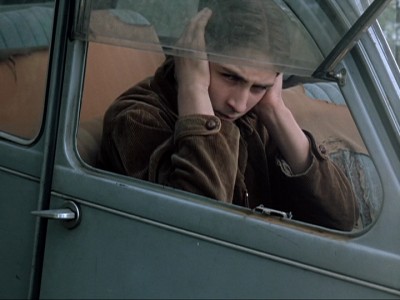
One more masterpiece in a career that had more than its fair share (and was, indeed, one of the most consistently fully-realized, uncompromising bodies of work in the history of cinema), Robert Bresson's penultimate film, 1977's The Devil, Probably (Le Diable, probablement), once again attains that impossible-seeming profundity through extreme simplicity that was Bresson's artistic holy grail. That's not to equate the simple and direct with anything easy, however; The Devil, Probably's depiction of one young man's thwarted quest for meaning as he's torn between love and sex, empty/hypocritical religion and chic, mindless nihilism, is both emotionally shattering and enough of a moral and philosophical puzzle to leave your mind reeling for a very long time. But the challenge of Bresson's incomparably pure, sublime films never feels like a strenuous effort -- more like struggling, as he's doing through the medium, for a kind of elusive grace and clarity-- and The Devil, Probably is no exception. Like most of this master's output, and despite being full of anguish and absent of ready solutions or happy endings, it offers an artistic happy end, an experience of the brilliant way in which the filmmaker has painstakingly bent all the rules, tools, and materials of the medium to his own longing, probing, unfailingly deep vision. That experience is oddly, singularly gratifying and fulfilling; Bresson is as close to an "original" as post-silent era cinema comes, and The Devil, Probably is a perfect manifestation of that originality, a cause (like the film's at-long-last arrival on DVD in North America) for rejoicing. DVD Talk Collector Series.
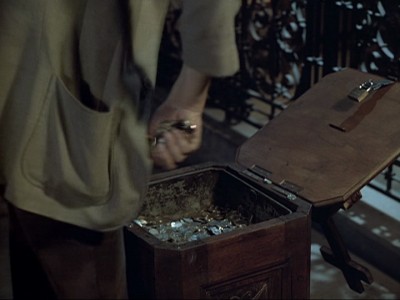
|
| Popular Reviews |
| Sponsored Links |
|
|
| Sponsored Links |
|
|
| Release List | Reviews | Shop | Newsletter | Forum | DVD Giveaways | Blu-Ray | Advertise |
|
Copyright 2024 DVDTalk.com All Rights Reserved. Legal Info, Privacy Policy, Terms of Use,
Manage Preferences,
Your Privacy Choices | |||||||









